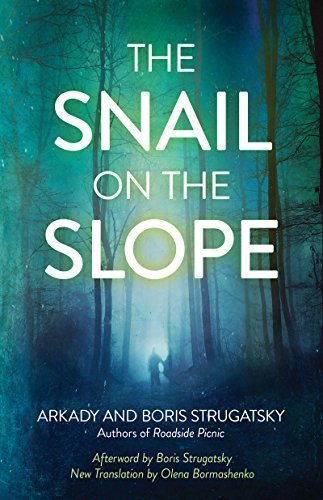What do you think?
Rate this book


250 pages, Kindle Edition
First published January 1, 1966
Progress may turn out to be completely indifferent to the notions of kindness and honesty, just like it has been indifferent to them thus far. The Administration, for example, needs neither honesty nor kindness to function properly. These things are nice, they are preferable, but they are by no means necessary.
“…and it turned out,” Nava was saying, “that the deadlings were taking us somewhere at night, but at night they don’t see well, they’re almost blind, and anyone will tell you so, Humpy, say, would tell you, but then he’s not from these parts, he’s from the village that was next to our village, not the one we live in now, but the one I lived in without you, with my mom. So you couldn’t know Humpy, his village got overgrown with mushrooms, the mushrooms took over, and it’s not everyone who likes that, Humpy, now, he left the village immediately. There was a Surpassment, he said, and now the village isn’t fit for people… Yeah. And there was no moon at the time, and they probably got lost, everyone got crowded together, and there we were, stuck in the middle, and it got so hot, I could barely breathe…”
“…The Administration can realistically only manage an insignificant portion of the territory in the ocean of forest that envelops the continent. There is no meaning of life, nor is there any meaning to our acts. We can do a great many things, but we still haven’t figured out which of these things we actually ought to do. It doesn’t even resist, it simply doesn’t notice. If an act has brought you pleasure, it was good; if it didn’t – it was meaningless. We resist with millions of horsepower, with dozens of ATVs, airships, and helicopters, with medical science and with the best theory of logistics in the world. The Administration has revealed itself to have at least two serious flaws. Currently, deeds of this sort can have far-reaching encrypted messages in the name of Herostratus, so that he remains our most beloved friend. It is completely incapable of creating without undermining authority or showing ingratitude.”
The cloaca was having a litter. Blobs of rippling, quivering white dough were being extruded onto its flat banks with impatient jerks; they rolled blindly and helplessly along the ground, then they paused, flattened out, extended a number of cautious pseudopods, and began to move in a deliberate manner – they continued to wiggle and root, but they were now all heading the same direction, one particular direction, wandering off then bumping into one another, but continuing to go the same way, following the same ray away from the womb, streaming into the thickets in a single white column, looking like giant, pouchy, slug-like ants…
“’[…] They are only missing one thing: the capacity to understand. They’ve always found substitutes for understanding: faith, atheism, indifference, contempt. For some reason, it has always been easiest. It is easier to believe than to understand. It is easier to be disillusioned than to understand. It is easier to give up in disgust than to understand. […]’”
Peretz stroked his swelling finger and watched the pups. The children of the forest. Or maybe the servants of the forest. Or maybe the excrement of the forest... They moved slowly and tirelessly in single file, seeming to flow along the ground, streaming over rotten tree trunks, over the ditches, across the stagnant puddles, through the tall grass, and through the thornbushes. The trail would disappear, plunging into the fragrant mud or hiding beneath the layers of hard grey mushrooms that crunched under their wheels, then it would reappear again, and the pups kept to the trail and managed to remain clean, white, smooth - no dust clung to them, no thorn left a mark on them, and they didn't get covered in the sticky black mud. They flowed forward with dull, unreflecting confidence, as if following a familiar road, one they knew well. There were forty-three of them.
[...]
"I've noticed one thing," said Quentin. "The size of the litter is always a prime: thirteen, forty-three, forty-seven..."
"Nonsense," objected Stoyan. "I've met groups of six or twelve in the forest."
"That's in the forest," said Quentin. "After a while, they split off in different directions. But the number of pups in a litter is always prime - you can check the logbook, I recorded every number..."
"And one time," said Randy, "me and my pals caught one of the local girls - that was a hoot!"
"Well, then, write a paper," said Stoyan.
"I've already written it," said Quentin. "It'll be my fifteenth."
"I've published seventeen," said Stoyan, "and I have another one due to appear. Who's going to be your coauthor?"
"I don't know yet," said Quentin. "Kim recommends the garage foreman - he says that transportation is essential nowadays - and Rita suggests the hotel manager."